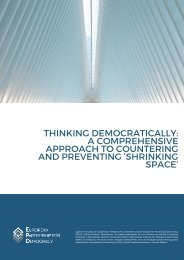Repression and resilience: Diagnosing closing space mid-pandemic
You also want an ePaper? Increase the reach of your titles
YUMPU automatically turns print PDFs into web optimized ePapers that Google loves.
REPRESSION AND RESILIENCE: DIAGNOSING CLOSING SPACE MID-PANDEMIC<br />
11<br />
Moreover, ruling parties can indirectly skew the playing<br />
field in their favour by exerting power <strong>and</strong> legal<br />
influence over other state institutions <strong>and</strong> governmental<br />
bodies, such as those organs responsible for electoral<br />
management.<br />
The abuse of state resources during electoral campaigns<br />
a<strong>mid</strong> the p<strong>and</strong>emic was most visible in the selective<br />
enforcement of COVID measures by police forces on<br />
campaigning activities of the opposition. In Ug<strong>and</strong>a,<br />
p<strong>and</strong>emic measures were used to justify a ban on party<br />
meetings, assemblies <strong>and</strong> campaigning events of all<br />
opposition parties, with excessive use of force by the<br />
police. At the same time, the ruling party continued to<br />
campaign <strong>and</strong> meet with its electorate in person without<br />
any restrictions or safety precautions.<br />
Electoral reforms: Reforms of electoral law may<br />
place high barriers to entry, either through registration<br />
requirements or electoral thresholds, with the result of<br />
restricting voters’ options <strong>and</strong> creating an advantage<br />
to large political parties such as the ruling party. At<br />
the same time, ruling parties can purposefully obstruct<br />
positive democratic reform because the status quo<br />
already favours their hold on power. As a consequence,<br />
voting becomes the least effective way to effect change<br />
<strong>and</strong> becomes discredited in the eyes of citizens.<br />
While some governments, like in Venezuela, used the<br />
p<strong>and</strong>emic’s lack of oversight to reform their electoral<br />
legislation, this was the exception rather than the rule.<br />
Illicit campaign finance: Campaign finance collected<br />
through opaque practices greatly undermines fair<br />
competition of political groups. 18 Political parties at<br />
times engage in rent-seeking behaviour by succumbing<br />
to powerful economic interests - including those of<br />
criminal groups - to obtain sufficient resources for their<br />
operations.<br />
In many countries, public procurement processes<br />
regarding p<strong>and</strong>emic equipment served to enrich elites<br />
rather than alleviate societal needs, with much public<br />
funding lost to corruption. While this was generally<br />
not directly related to campaign funding, it did fuel<br />
the corruption networks that are at the basis of illicit<br />
campaign finance.<br />
3. Checks <strong>and</strong> balances<br />
A third tactic to close democratic <strong>space</strong> is the<br />
undermining of the rule of law, the separation of powers,<br />
<strong>and</strong> the system of checks <strong>and</strong> balances that are all key<br />
to healthy democracies.<br />
Independence of the judiciary: The role of the judiciary<br />
to defend fundamental freedoms <strong>and</strong> uphold the<br />
constitution makes it a primary target of such attacks.<br />
The appointment of partisan figures <strong>and</strong> the dismissal<br />
of independent judges are two common ways to<br />
compromise judicial independence.<br />
The adaptation to the online working environment<br />
<strong>and</strong> state of emergency greatly limited the ability of<br />
judiciaries to oversee the executive, <strong>and</strong> it was not<br />
necessarily the result of deliberate attacks on democratic<br />
<strong>space</strong>. The passing of an excessive number of bills under<br />
the emergency state, however, did greatly compromise<br />
the judiciary’s ability to uphold constitutionalism. In cases<br />
like Columbia, where many of these bills were not related<br />
to the p<strong>and</strong>emic at all, this can be considered as an<br />
intentional attack on the judiciary’s ability to operate <strong>and</strong><br />
oversee the executive.<br />
Impunity: The politicisation of legal processes allows<br />
impunity <strong>and</strong> violence to thrive: this endangers the action<br />
<strong>and</strong> lives of human rights defenders 19 , journalists 20 , <strong>and</strong><br />
civil society representatives. 21 The ensuing erosion of the<br />
rule of law has an unmeasurable negative impact on<br />
18 OECD (2016): Financing Democracy: Funding of Political Parties <strong>and</strong> Election Campaigns <strong>and</strong> the Risk of Policy Capture. Available here.<br />
19 OHCHR (2019): Report on impunity for human rights violations <strong>and</strong> abuses committed against human rights defenders. Available here.<br />
20 UNESCO (2020): Director-General’s report on the safety of journalists <strong>and</strong> the danger of impunity. Available here.<br />
21 Open Government Partnership (2019): Defending Activists <strong>and</strong> Journalists: Open Government Partnership Global Report. Available here.

















